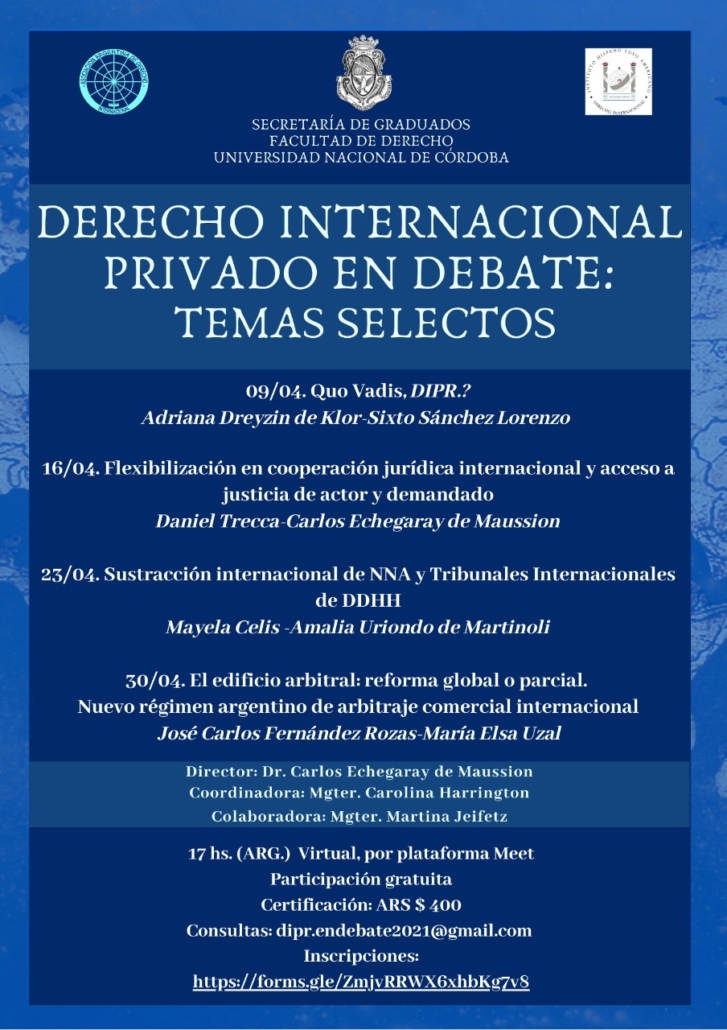Views
Nothing Found
Sorry, no posts matched your criteria
News
First Issue of 2021’s Revue Critique de Droit International Privé
The last issue of the Revue critique de droit international privé has been released. It contains several case notes and four articles.
The first article, by Didier Boden (University of Paris 1 Pantheon Sorbonne), proposes new names and definitions in order to enrich private international law. Pursuant to the author: “Private international law and the other sets of rules of a legal order which touch upon its relations with other legal orders are poorly named and poorly defined”. The article “proposes to remedy that lexical impropriety and that semantic deficiency by presenting a new collection of names and a new collection of definitions”.
The Second article, authored by Frederick T. Davis (Columbia Law School) and Charlotte Gunka (Attorney-at-law, New York Bar), discusses the possibilities offered by the American CLOUD Act, with regard to criminal and digital sovereignty. The abstract reads as follows: “At a time when the Covid-19 crisis has raised awareness over the urgent need for European Member States to enhance their national sovereignty through the European Union, it is essential to go back to the possibilities offered by the U.S. CLOUD Act with regard to criminal and digital sovereignty. The CLOUD Act proposes a reform of current mutual legal assistance mechanisms by establishing access to digital evidence as the benchmark authorizing computer searches outside state borders, regardless of the location of the relevant data. Although this benchmark allows for more extensive extraterritorial application of U.S. criminal proceedings, an analysis of European regulations and legislation currently in force in France and the United Kingdom confirms that the European approach is not so different from the one introduced by the U.S. government. The emergence of the computer world and the acceleration of new technologies have created a “criminal digital space”, ephemeral and borderless, which requires a fundamental transformation of criminal procedures allowing for faster and more efficient international cooperation against transnational crime. This should give an opportunity to Europe, in particular through its new European Public Prosecutor’s Office, to assert its digital sovereignty through the individual fundamental rights that it continues to promote without undermining the security and strategic interests of its Member States”.
The third article, by Vincent Richard (Max Planck Institute Luxembourg) presents the new Regulation (EU) no 2020/1783 adopted on 25 November 2020, which recasts Regulation (EC) no 1206/2001 on cooperation between the courts of the Member States in the taking of evidence in civil or commercial matters.
The fourth article, by Thibaut Fleury Graff (University of Rennes) deals with the issues of the rights of foreigners and international migrations.
A full table of contents is available here.
April 12: Jan L Neels on the African Principles of Commercial Private International Law
 On Monday, 12 April 2021, from 14:00 to 15:00 (CET), the Hamburg Max Planck Institute will host the first presentations in a new monthly “Private International Law in Africa” series, chaired by Justin Monsenepwo, the new head of the Africa desk. Professor Jan L Neels (University of Johannesburg) will be speaking on the topic:
On Monday, 12 April 2021, from 14:00 to 15:00 (CET), the Hamburg Max Planck Institute will host the first presentations in a new monthly “Private International Law in Africa” series, chaired by Justin Monsenepwo, the new head of the Africa desk. Professor Jan L Neels (University of Johannesburg) will be speaking on the topic:
“An Introduction to the African Principles of Commercial Private International Law”
The zoom presentation will be followed by an open discussion. All are welcome. After having registered no later than 9 April 2021 using this link you will receive the login details on Friday afternoon. More information and sign-up here.
The “Private International Law in Africa” series intends to discuss new scholarly work on private international law in Africa and advance solutions on how the current framework of that field can be improved on the continent. In an environment of growing international transactions in both civil and commercial matters, private international law can play a significant role in enhancing legal and judicial security and predictability in Africa.
In May 2021 the next speaker will be Dr. Abubakri Yekini (Lagos State University), who will speak on the topic “Enforceability of Jurisdiction Agreements in Nigeria”.
If you want to be invited to these events in the future, please write to veranstaltungen@mpipriv.de.



